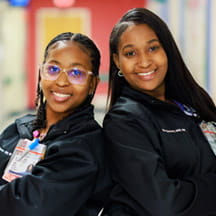When Emily Smith and the nurses on her team began their careers in pediatric medicine, they probably never imagined they'd one day be treating adults. Yet that's exactly where they found themselves earlier this year.
"It felt like coming full circle," says Smith, RN, clinical manager, The Children's Hospital at Saint Francis in Tulsa, Oklahoma. "It was unexpected, but everyone really enjoyed it; every one of our patients was so grateful and thankful."
Children's unit in prime position to help
As cases spiked around the Tulsa area late last year, adult COVID-19 patients overwhelmed resources at Saint Francis Hospital.
The hospital was administering infusions of the monoclonal antibody Bamlavinimab to help adult COVID-19 patients reduce the severity of their symptoms and lower hospitalization numbers. But with a very limited number of negative pressure rooms available on the adult side and staff already stretched thin after several months in a pandemic, the hospital couldn't keep up with the demand.
Meanwhile, patient counts at the Children's Hospital—like most pediatric institutions nationally—were lower than normal. And the Children's Hospital's respiratory and pulmonary unit had 30 negative pressure rooms; it was an ideal setting for an adult outpatient infusion clinic.
"It felt like it was almost meant to be," Smith says. "We were in an extremely unique position to do this—with the staff, beds, negative pressure rooms and low census—it all made sense and lined up."
Pediatric experience a difference maker for adult patients
But it was more than just empty beds and available staff that made Smith's team a perfect fit for infusion clinic duty. Since only COVID-19 patients who were at high risk for severe illness were eligible for antibody infusion at the time, many were anxious and scared. Smith says her team's training and experience in pediatrics suited them to work with the adult patients.
"Pediatric nurses are definitely used to dealing with fear—our patients are afraid of things that wouldn't be scary for adults," Smith says. "Having the experience of calming our scared kiddos and parents was definitely a skill we were able to use."
The pediatric nurses also helped improve the treatment process. After about a week of assisting with infusions, Smith's team members noticed expanding some order sets could prevent some COVID-19 patients from requiring a trip to the emergency room (ER).
If some patients, they suggested, could be given Tylenol for a fever or a bolus of liquid for dehydration, their symptoms would improve, and they could receive their antibody infusion instead of being sent to the crowded ER. Leadership implemented the recommendations, which reduced ER admissions for many COVID-19 patients, according to Smith.
Power of positive thinking
The impact Smith and her team of about 20 nurses had on patient care at Saint Francis Hospital is significant: In addition to helping hundreds of COVID-19 patients recover with antibody infusions, the nurses alleviated a stressed health care system and provided much-needed help to their colleagues on the adult side. For Smith, the response from her team serves as a tremendous source of pride.
"I was so impressed with the attitude of my team," Smith says. "Nurses have obviously been very stressed working in a hospital during a pandemic, but every day they were all just excited to be there and help—it definitely wouldn't have happened without them."


